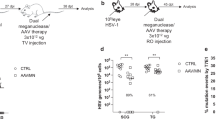Abstract
H-1 VIRUS, one of a new group of small agents that produce a specific deformity when injected into newborn hamsters1–4, is presumed to contain DNA5, It has been suggested recently, on the basis of its staining reaction with acridine orange, that the nucleic acid of X14 (ref, 4), another member of the H-viruses, is single-stranded DNA (ref, 6). No other animal virus is known to contain DNA of this kind, with the possible exception of the defective adenosatellite viruses7, and the H-viruses would appear to merit particular attention. Until now, biochemical experiments on any of the H-viruses have been hampered by the lack of a plaque assay system. This communication reports the development of a plaque assay for H-1 and the results of an investigation of the effects of the DNA antagonists 5-iodo-2′-deoxyuridine (IUDR) and cytosine arabinoside (1-β-D-arabinofuranosylcytosine) (ara C) on the synthesis of H-1. In the presence of ara C, infected cells failed to produce either viral haemagglutination activity (HA) or infectivity, while IUDR did not prevent HA but markedly reduced infective virus formation.
This is a preview of subscription content, access via your institution
Access options
Subscribe to this journal
Receive 51 print issues and online access
$199.00 per year
only $3.90 per issue
Buy this article
- Purchase on Springer Link
- Instant access to full article PDF
Prices may be subject to local taxes which are calculated during checkout
Similar content being viewed by others
References
Toolan, H. W., Science, 131, 1446 (1960).
Toolan, H. W., Dalldorf, G., Barclay, M., Chandra, S., and Moore, A. E., Proc. Soc. Exp. Biol. and Med., 46, 1256 (1960).
Kilham, L., Virology, 13, 141 (1961).
Payne, F. E., Beals, T. F., and Preston, R. E., Virology, 23, 109 (1964).
Cheong, L., Fogh, J., and Barclay, R. K., Fed. Proc., 24, 596 (1965).
Jamison, R. M., and Mayor, H. D., J. Bact., 90, 1486 (1965).
Mayor, H. D., and Melnick, J. L., Nature, 210, 331 (1966).
Toolan, H., and Ledinko, N., Nature, 208, 812 (1965).
Winocour, E., Virology, 19, 158 (1963).
Greene, E. L., Proc. Soc. Exp. Biol. and Med., 118, 973 (1965).
Greene, E. L., and Karasaki, S., Proc. Soc. Exp. Biol. and Med., 119, 918 (1965).
Rapp, F., Melnick, J. L., and Kitahara, T., Science, 147, 625 (1965).
Ledinko, N., Virology, 20, 107 (1963).
Author information
Authors and Affiliations
Rights and permissions
About this article
Cite this article
LEDINKO, N. Plaque Assay of the Effects of Cytosine Arabinoside and 5-lodo-2′-deoxyuridine on the Synthesis of H-1 Virus Particles. Nature 214, 1346–1347 (1967). https://doi.org/10.1038/2141346a0
Received:
Revised:
Issue Date:
DOI: https://doi.org/10.1038/2141346a0
This article is cited by
-
Inhibitory effect of parvovirus H-1 on the formation of colonies of human hepatoma cell line in vitro and its tumors in nude mice
Cell Research (1994)
-
Parvoviruses as contaminants of permanent human cell lines III. Biological properties of the isolated viruses
Archiv f�r die gesamte Virusforschung (1972)
Comments
By submitting a comment you agree to abide by our Terms and Community Guidelines. If you find something abusive or that does not comply with our terms or guidelines please flag it as inappropriate.



